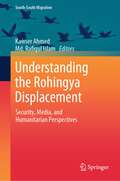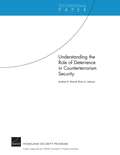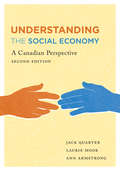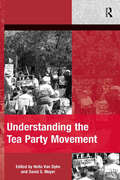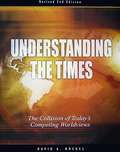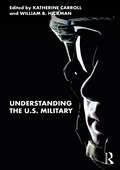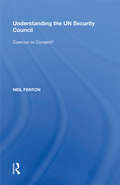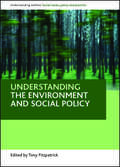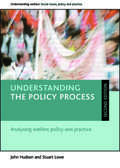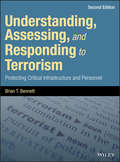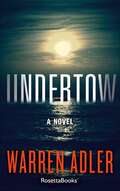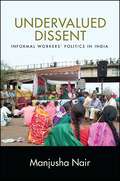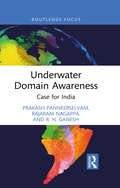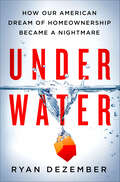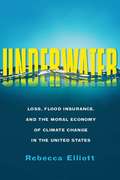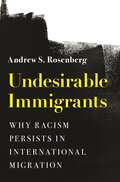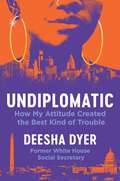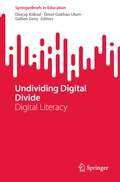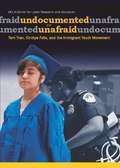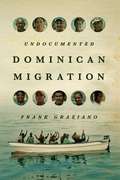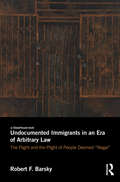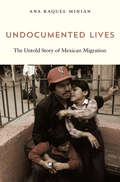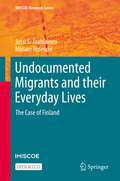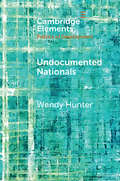- Table View
- List View
Understanding the Rohingya Displacement: Security, Media, and Humanitarian Perspectives (International Perspectives on Migration)
by Kawser Ahmed Md. Rafiqul IslamThis book provides a focused and comprehensive understanding of the conflict surrounding the Rohingya displacement, using a unique peace and conflict transformation viewpoint. Divided into four sections and nineteen chapters, it covers significant themes related to the conflict. It provides an in-depth examination of its security implications, media impact, and the need for a long-term transformation strategy. The authors offer a sharp perspective on the crisis, covering a wide range of topics, including human rights abuses, geopolitics, media influence, and repatriation of the Rohingya. Each chapter focuses on a different aspect of the conflict, providing readers with a thorough understanding of the Rohingya displacement-related conflict. The authors advocate for a peaceful end to the conflict through repatriation, offering valuable conflict transformation tools for decision-makers in Bangladesh and around the world. This book is essential for anyone seeking a deeper understandingof the conflict's security implications and highlights original research from academics on the role of the media. It is relevant for scholars, politicians, decision-makers in the security and refugee management fields, academics studying the media, and humanitarian actors.
Understanding the Role of Deterrence in Counterterrorism Security
by Brian A. Jackson Andrew R. MorralDeterrence--a central feature of counterterrorism security systems and a major factor in the cost-effectiveness of many security programs--is not well understood or measured. This paper offers a framework for understanding how security systems may deter or displace attacks and how to measure the relative deterrent value of alternative systems. This framework may aid in attempts to achieve increased security benefits with limited resources.
Understanding the Social Economy: A Canadian Perspective, Second Edition
by Jack Quarter Laurie Mook Ann ArmstrongSuitable for courses addressing community economic development, non-profit organizations, co-operatives and the social economy more broadly, the second edition of Understanding the Social Economy expands on the authors’ ground-breaking examination of organizations founded on a social mission – social enterprises, non-profits, co-operatives, credit unions, and community development organizations. While the role of the private and public sectors are very much in the public light, the social economy is often taken for granted. However, try to imagine a society without the many forms of organizations that form the social economy: social service organizations, arts and recreation organizations, ethno-cultural associations, social clubs, self-help groups, universities and colleges, hospitals and other healthcare providers, foundations, housing co-operatives, or credit unions. Not only do these organizations provide valuable services, but they employ many people, and purchase goods and services. They are both social and economic entities. Understanding the Social Economy illustrates how organizations in the social economy interact with the other sectors of the economy and highlights the important social infrastructure that these organizations create. The second edition contains six new case studies as well three new chapters addressing leadership and strategic management, and human resources management. A much-needed work on an important but neglected facet of organizational studies, Understanding the Social Economy continues to be an invaluable resource for the classroom and for participants working in the social sector.
Understanding the Tea Party Movement (The Mobilization Series on Social Movements, Protest, and Culture)
by Nella Van DykeHailing themselves as heirs to the American Revolution, the Tea Party movement staged tax day protests in over 750 US cities in April 2009, quickly establishing a large and volatile social movement. Tea Partiers protested at town hall meetings about health care across the country in August, leading to a large national demonstration in Washington on September 12, 2009. The movement spurred the formation (or redefinition) of several national organizations and many more local groups, and emerged as a strong force within the Republican Party. Self-described Tea Party candidates won victories in the November 2010 elections. Even as activists demonstrated their strength and entered government, the future of the movement's influence, and even its ultimate goals, are very much in doubt. In 2012, Barack Obama, the movement’s prime target, decisively won re-election, Congressional Republicans were unable to govern, and the Republican Party publicly wrestled with how to manage the insurgency within. Although there is a long history of conservative movements in America, the library of social movement studies leans heavily to the left. The Tea Party movement, its sudden emergence and its uncertain fate, provides a challenge to mainstream American politics. It also challenges scholars of social movements to reconcile this new movement with existing knowledge about social movements in America. Understanding the Tea Party Movement addresses these challenges by explaining why and how the movement emerged when it did, how it relates to earlier eruptions of conservative populism, and by raising critical questions about the movement's ultimate fate.
Understanding the Times: The Collision of Today's Competing Worldviews (Revised 2nd edition)
by David NoebelComparison of Christianity vs. Islam, Secular Humanism, Marxism, Cosmic Humanism, and Postmodernism in the areas of theology, philosophy, ethics, biology, psychology, sociology, law, politics, economics, and history.
Understanding the U.S. Military
by Katherine Carroll William B. HickmanThis book offers an accessible introduction to the U.S. military as an institution and provides insights into the military’s structure and norms. Designed for undergraduate students, the book offers an interdisciplinary overview of America’s armed forces through three critical lenses. First, it introduces the military’s constitutional and historical context. Second, it presents concise factual information chosen for its relevance to the military’s structures, procedures, norms, and varied activities. Finally, it intersperses these facts with debates, theories, and questions to spark student interest, class discussion, and further research. The text is written for the beginner but covers complex topics such as force structure and the defense budget. With contributions informed by both scholarly approaches and long military careers, the book will prepare students for further studies in international relations, civil-military relations, or U.S. foreign policy. It also encourages critical thinking, elucidating an institution that undergraduates and other civilians too often perceive as both baffling and above reproach. This book will be of much interest to students of the U.S. military, civil-military relations, U.S. politics, and public policy.
Understanding the UN Security Council: Coercion or Consent?
by Neil FentonThis impressive work sheds light on the recent history of the UN Security Council (UNSC), examining how the penchant for UN-backed humanitarian intervention in the 1990s has given way to an impotent UNSC, unable to play a meaningful role in the war in Iraq. It examines the precepts that govern UNSC politics, including the sanctity of sovereign states, the norm of non-intervention and state interests. Designed for readers who are interested in gaining a deeper understanding of the workings of the UNSC, the attitudes of its members towards the use of force and sovereignty, as well as understanding its limitations in international politics, this volume: · evaluates key issues such as the principle of consent, the use of force, intervention and sovereignty · provides a rich array of case studies to understand the challenges of consent-based peacekeeping · presents strong analytical consistency drawing on a wide variety of sources
Understanding the environment and social policy (Understanding Welfare: Social Issues, Policy and Practice)
by Tony FitzpatrickBringing together leading experts, this textbook explores the key social, political, economic and moral challenges that environmental problems pose for social policy in a global context. Combining theory and practice with an interdisciplinary approach, the book reviews the current strategies and policies and provides a critique of proposed future developments in the field. Understanding the environment and social policy guides the reader through the subject in an accessible way using chapter summaries, further reading, recommended webpages, a glossary and questions for discussion. Providing a much-needed overview, the book will be invaluable reading for students, teachers, activists, practitioners and policymakers.
Understanding the policy process: Analysing welfare policy and practice (Understanding Welfare: Social Issues, Policy and Practice)
by John Hudson Stuart LoweThis book draws on the latest and best social science to explain how and why social policy change occurs. Focusing on the policy making process as the key to change, it uses core concepts of policy analysis, one in each chapter, to build up a fully worked explanation of social policy change and to equip readers with knowledge that can be applied to any aspect of welfare policy and public and social policy more generally. This second edition of the book updates the bestselling first edition for the post-Blair era with international case studies from numerous countries. Understanding the policy process: · introduces the main themes of the policy analysis literature; · demonstrates the centrality of the policy making process to an understanding of the operational possibilities and limits of social policy; · takes account of macro-, meso- and micro-level approaches to social policy analysis; · uses clear explanations of key concepts, up-to-date illustrative case studies and examples to increase students' understanding of the theory and practice of policy analysis; · uses a comparative approach.
Understanding, Assessing, and Responding to Terrorism: Protecting Critical Infrastructure and Personnel
by Brian T. BennettA comprehensive guide to understanding, assessing, and responding to terrorism in this modern age This book provides readers with a thorough understanding of the types of attacks that may be perpetrated, and how to identify potential targets, conduct a meaningful vulnerability analysis, and apply protective measures to secure personnel and facilities. The new edition of Understanding, Assessing, and Responding to Terrorism updates existing material and includes several new topics that have emerged, including information on new international terrorist groups as well as a new chapter on Regulations and Standards. A vulnerability analysis methodology, consisting of several steps--which include the techniques necessary to conduct a vulnerability analysis--is introduced and applied through several sample scenarios. By using easily customized templates for the screening process, valuation of a critical asset as a target, vulnerability analysis, security procedures, emergency response procedures, and training programs, the book offers a practical step-by-step process to help reduce risk. Each different type of terrorism is briefly discussed--however, the book focuses on those potential attacks that may involve weapons of mass destruction. There is a discussion of what physical and administrative enhancements can be implemented to improve a facility's ability to devalue, detect, deter, deny, delay, defend, respond, and recover to a real or threatened terrorist attack--whether it be at a facility, or in the community. Techniques on how personnel safety and security can be improved through the implementation of counter-terrorism programs are also outlined. An overview of the major counter-terrorism regulations and standards are presented, along with the significant governmental efforts that have been implemented to help prevent terrorist attacks and foster preparedness at both private and public sector facilities and for personnel. Understanding, Assessing, and Responding to Terrorism, Second Edition: Updates existing material, plus includes several new topics that have emerged including information on new international terrorist groups, new terrorist tactics, cyber terrorism, and Regulations and Standards Outlines techniques for improving facility and personnel safety and security through the implementation of counter-terrorism programs Unites the emergency response/public sector community with the private sector over infrastructure protection, thus allowing for easier communication between them Includes questions/exercises at the end of each chapter and a solutions manual to facilitate its use as a textbook Understanding, Assessing, and Responding to Terrorism, Second Edition is a must-have reference for private and public sector risk managers, safety engineers, security professionals, facility managers, emergency responders, and others charged with protecting facilities and personnel from all types of hazards (accidental, intentional, and natural).
Undertow
by Warren AdlerA womanizing married senator, enjoying a tryst in his Delaware beach home with a beautiful woman, discovers that his paramour has accidentally drowned. Aware of the scandal that could ensue and destroy his political career, the Senator mounts a campaign of cover-up and cynical lies designed to deflect the potential damage. This suspenseful tale of adultery, media manipulation, and political chicanery has familiar overtones and exposes the dilemma faced by any public figure who chooses the path of dissimulation and lying to protect his or her career. This story mirrors today's headlines and provides insights into the dark netherworld of political manipulation.
Undervalued Dissent: Informal Workers' Politics in India (SUNY series in Global Modernity)
by Manjusha NairHonorable Mention, 2018 Global Division Book Award presented by the Global Division of the Society for the Study of Social ProblemsHistorically, the Indian state has not offered welfare and social rights to all of its citizens, yet a remarkable characteristic of its polity has been the ability of citizens to dissent in a democratic way. In Undervalued Dissent, Manjusha Nair argues that this democratic space has been vanishing slowly. Based on extensive fieldwork in Chhattisgarh, a regional state in central India, this book examines two different informal workers' movements. Informal workers are not part of organized labor unions and make up eighty-five percent of the Indian workforce. The first movement started in 1977 and was a success, while the other movement began in 1989 and still continues today, without success. The workers in both movements had similar backgrounds, skills, demands, and strategies. Nair maintains that the first movement succeeded because the workers contended within a labor regime that allowed space for democratic dissent, and the second movement failed because they contested within a widely altered labor regime following neoliberal reforms, where these spaces of democratic dissent were preempted. The key difference between the two regimes, Nair suggests, is not in the withdrawal of a prolabor state from its protective and regulatory role, as has been argued by many, but rather in the rise of a new kind of state that became functionally decentralized, economically predatory, and politically communalized. These changes, Nair concludes, successfully de-democratized labor politics in India.
Underwater Cultural Heritage and International Law
by Sarah DromgooleThe UNESCO Convention on the Protection of the Underwater Cultural Heritage 2001, which entered into force internationally in 2009, is designed to deal with threats to underwater cultural heritage arising as a result of advances in deep-water technology. However, the relationship between this new treaty and the UN Convention on the Law of the Sea is deeply controversial. This study of the international legal framework regulating human interference with underwater cultural heritage explores the development and present status of the framework and gives some consideration to how it may evolve in the future. The central themes are the issues that provided the UNESCO negotiators with their greatest challenges: the question of ownership rights in sunken vessels and cargoes; sovereign immunity and sunken warships; the application of salvage law; the ethics of commercial exploitation; and, most crucially, the question of jurisdictional competence to regulate activities beyond territorial sea limits.
Underwater Domain Awareness: Case for India
by Rajaram Nagappa Prakash Panneerselvam R N GaneshThis book presents a comprehensive analysis of the emerging underwater challenges facing India in the Indian Ocean region. With major economic powers like China, the United States, and Russia modernising their submarine fleets and building advanced unmanned underwater vessels to enhance surveillance capabilities, the competition in the Indo-Pacific underwater domain has intensified. The book · Focuses on the issues of detecting, tracking, and classifying submarines/underwater drones in the Indian Ocean. · Examines the Indian Navy’s present anti-submarine warfare (ASW) capabilities in combating underwater threats and discusses the scope for inter-agency, inter-departmental cooperation framework to monitor the undersea activity in the region. · Studies the naval composition and strengths of India and other countries in the neighbourhood and reviews maritime domain awareness practices employed by leading navies including NATO for submarine detection. · Assesses the technology development efforts to deal with these challenges and brings out recommendations. An expert study of undersea surveillance, this book will be indispensable to students and researchers of military and strategic studies, defence studies, critical security, conflict resolution, intelligence studies, and security studies. It will also be of interest to governments, naval establishments, think tanks, and public policy institutes.
Underwater: How Our American Dream of Homeownership Became a Nightmare
by Ryan DezemberWinner of the Bruss Real Estate Book AwardHis assignment was to write about a real-estate frenzy lighting up the Redneck Riviera. So Ryan Dezember settled in and bought a home nearby himself. Then the market crashed, and he became one of the millions of Americans who suddenly owed more on their homes than they were worth. A flood of foreclosures made it impossible to sell. It didn't help that his quaint neighborhood fell into disrepair and drug-induced despair. He had no choice but to become a reluctant and wildly unprofitable landlord to move on. Meanwhile, his reporting showed how the speculative mania that caused the crash opened the U.S. housing market to a much larger breed of investors. In this deeply personal story, Dezember shows how decisions on Wall Street and in Washington played out on his street in a corner of the Sunbelt that was convulsed by the foreclosure crisis. Readers will witness the housing market collapse from Dezember’s perch as a newspaper reporter. First he’s in the boom-to-bust South where a hot-air balloonist named Bob Shallow becomes one of the world’s top selling real-estate agents arranging condo flips, developers flop in spectacular fashion and the law catches up with a beach-town mayor on the take. Later he’s in New York, among financiers like Blackstone’s Stephen Schwarzman who are building rental empires out of foreclosures, staking claim to the bastion of middle-class wealth: the single-family home. Through it all, Dezember is an underwater homeowner caught up in the mess.A cautionary tale of Wall Street's push to turn homes into assets, Underwater is a powerful, incisive story that chronicles the crash and its aftermath from a fresh perspective—the forgotten, middle-class homeowner.
Underwater: Loss, Flood Insurance, and the Moral Economy of Climate Change in the United States (Society and the Environment)
by Rebecca ElliottCommunities around the United States face the threat of being underwater. This is not only a matter of rising waters reaching the doorstep. It is also the threat of being financially underwater, owning assets worth less than the money borrowed to obtain them. Many areas around the country may become economically uninhabitable before they become physically unlivable.In Underwater, Rebecca Elliott explores how families, communities, and governments confront problems of loss as the climate changes. She offers the first in-depth account of the politics and social effects of the U.S. National Flood Insurance Program (NFIP), which provides flood insurance protection for virtually all homes and small businesses that require it. In doing so, the NFIP turns the risk of flooding into an immediate economic reality, shaping who lives on the waterfront, on what terms, and at what cost.Drawing on archival, interview, ethnographic, and other documentary data, Elliott follows controversies over the NFIP from its establishment in the 1960s to the present, from local backlash over flood maps to Congressional debates over insurance reform. Though flood insurance is often portrayed as a rational solution for managing risk, it has ignited recurring fights over what is fair and valuable, what needs protecting and what should be let go, who deserves assistance and on what terms, and whose expectations of future losses are used to govern the present. An incisive and comprehensive consideration of the fundamental dilemmas of moral economy underlying insurance, Underwater sheds new light on how Americans cope with loss as the water rises.
Undesirable Immigrants: Why Racism Persists in International Migration (Princeton Studies in International History and Politics #200)
by Andrew S. RosenbergHow the racist legacy of colonialism shapes global migrationThe Immigration and Nationality Act of 1965 officially ended the explicit prejudice in American immigration policy that began with the 1790 restriction on naturalization to free White persons of “good character.” By the 1980s, the rest of the Anglo-European world had followed suit, purging discriminatory language from their immigration laws and achieving what many believe to be a colorblind international system. Undesirable Immigrants challenges this notion, revealing how racial inequality persists in global migration despite the end of formally racist laws.In this eye-opening book, Andrew Rosenberg argues that while today’s leaders claim that their policies are objective and seek only to restrict obviously dangerous migrants, these policies are still correlated with race. He traces how colonialism and White supremacy catalyzed violence and sabotaged institutions around the world, and how this historical legacy has produced migrants that the former imperial powers and their allies now deem unfit to enter. Rosenberg shows how postcolonial states remain embedded in a Western culture that requires them to continuously perform their statehood, and how the closing and policing of international borders has become an important symbol of sovereignty, one that imposes harsher restrictions on non-White migrants.Drawing on a wealth of original quantitative evidence, Undesirable Immigrants demonstrates that we cannot address the challenges of international migration without coming to terms with the brutal history of colonialism.
Undiplomatic: How My Attitude Created the Best Kind of Trouble
by Deesha DyerWithout credentials or connections, community college student and advocate Deesha Dyer navigated her imposter syndrome, landing one of the most exclusive positions in the White House. From the most unlikely person to end up as a senior official to President Barack Obama and First Lady Michelle Obama comes a candid, incredible, and inspiring story. Moved by the election of the country&’s first Black president, Deesha Dyer applied for a White House internship in 2009 as a thirty-one-year-old part-time community college student, taking a leap that carried her into a permanent full-time position, followed by three promotions landing her at the epicenter of politics. In spite of the little voice in her head telling her she didn&’t deserve to be there, Deesha thrived and rose to the highly coveted role of White House social secretary, giving her a front-row seat to defining moments in history while curating some of the flyest parties 1600 Pennsylvania has ever seen. Yet, with humor and realness, she peels back the curtain, revealing the hard truth about why she spent years trying to hide behind it. Undiplomatic is a deeply personal narrative about combating self-doubt while being on top of the world. Deesha reflects on how imposter syndrome threatened her self-esteem, proven aptitude, and survival until she realized that it was neither her fault nor her responsibility. In this vivid portrayal from a true &“around the way girl&” on the personal impact of the Obama presidency, Deesha shares her road map from imposter to impact. In Undiplomatic, she invites you on a journey of self-discovery where she overcame doubt, unearthed true love for herself, and learned that your unique worth is not something to be earned, but something inherently deserved. Uplifting, funny, and sincere, Deesha&’s story shows you about authenticity at all costs, and the joy and freedom that awaits on the other side.
Undividing Digital Divide: Digital Literacy (SpringerBriefs in Education)
by Ömer Gökhan Ulum Dinçay Köksal Gülten GençThis book problematizes digital divide with critical lens by focusing on education in general and specifically second language education with an emphasis on the context of Turkey based on sound methodologies and robust theories of modernity, postmodernity, post-structuralism and post-method framework. In line with this conceptualization, critical thinking skills, social dialogue, collaboration, accessibility and digital literacy have been widely discussed empirically and prioritized in this book. In addition, social injustice, digital inequality, gender gap, economic disparity, demographic differences and knowledge divide have also been addressed. EFL teachers and pre-service teachers as cultural workers have been incorporated into the studies to critically reflect upon digital divide in Turkey. The views of teachers and learners at a socio-economic disadvantage emanating from socio-political issues have been addressed and foregrounded. The digital divide and inequalities that COVID-19 pandemic has produced have also been emphasized. The context of Turkey where digital divide has been prevalent during COVID-19 pandemic is believed to inspire researchers specializing in digitalization and digital education. The strategies, problems, effects and solutions have been presented. This book presents a reliable source to students, teachers and academics in education and second language education as well as social scientists and policy-makers across the globe.
Undocumented And Unafraid: Tam Tran, Cinthya Felix, And The Immigrant Youth Movement
by Victor Narro Kent Wong Janna Shadduck-Hernandez Fabiola Inzunza Julie Monroe Abel ValenzuelaA tribute to two immigrant students Tam Tran and Cinthya Felix as it presents a research on the experiences of undocumented youth and the misperceptions people have of them as they work towards a socialyl just society built on the foundation of "equal opportunity for all".
Undocumented Dominican Migration
by Frank GrazianoUndocumented Dominican Migration is the first comprehensive study of boat migration from the Dominican Republic to Puerto Rico. It brings together the interactive global, cultural, and personal factors that induce thousands of Dominicans to journey across the Mona Passage in attempts to escape chronic poverty. The book provides in-depth treatment of decision-making, experiences at sea, migrant smuggling operations, and U. S. border enforcement. It also explores several topics that are rare in migration studies. These include the psychology of migrant motivation, religious beliefs, corruption and impunity, procreation and parenting, compulsive recidivism after failed attempts, social values in relation to law, marriage fraud, and the use of false documents for air travel from Puerto Rico to the mainland United States. Frank Graziano’s extensive fieldwork among migrants, smugglers, and federal agencies provides an authority and immediacy that brings the reader close to the migrants’ experiences. The exhaustive research and multidisciplinary approach, highly readable narrative, and focus on lesser-known emigrants make Undocumented Dominican Migration an essential addition to public and academic debates about migration.
Undocumented Immigrants in an Era of Arbitrary Law: The Flight and the Plight of People Deemed 'Illegal'
by Robert F. BarskyThis book describes the experiences of undocumented migrants, all around the world, bringing to life the challenges they face from the moment they consider leaving their country of origin, until the time they are deported back to it. Drawing on a broad array of academic studies, including law, interpretation and translation studies, border studies, human rights, communication, critical discourse analysis and sociology, Robert Barsky argues that the arrays of actions that are taken against undocumented migrants are often arbitrary, and exercised by an array of officials who can and do exercise considerable discretion, both positive and negative. Employing insights from a decade-long research project, Barsky also finds that every stop along the migrant’s pathway into, and inside of, the host country is strewn with language issues, relating to intercultural communication, interpretation, gossip, hearsay, and the challenges of peddling of linguistic wares in the social discourse marketplace. These language issues are almost always impediments to anodyne or productive interactions with host country officials, particularly on the "front-lines" where migrants encounter border patrol and law enforcement officers without adequate means of communicating their situation or understanding their rights. Since undocumented people are categorized as ‘illegal’, they can be subjected to abuse and exploitation by host country officials, who can choose to either tolerate or punish them on the basis of unpredictable, changeable, and even illusory or "arbitrary" laws and regulations. Citing experts at every level of the undocumented immigrant apparatuses worldwide, from public defenders to interpreters, Barsky concludes that the only viable policy to address prevailing abuses and inequalities is to move towards open borders, an approach that would address prevailing issues and, surprisingly, provide security and economic benefits to both host and home countries.
Undocumented Lives: The Untold Story of Mexican Migration
by Ana Raquel MinianIn the 1970s the Mexican government acted to alleviate rural unemployment by supporting the migration of able-bodied men. Millions crossed into the United States to find work that would help them survive as well as sustain their families in Mexico. They took low-level positions that few Americans wanted and sent money back to communities that depended on their support. But as U.S. authorities pursued more aggressive anti-immigrant measures, migrants found themselves caught between the economic interests of competing governments. The fruits of their labor were needed in both places, and yet neither country made them feel welcome. Ana Raquel Minian explores this unique chapter in the history of Mexican migration. Undocumented Lives draws on private letters, songs, and oral testimony to recreate the experience of circular migration, which reshaped communities in the United States and Mexico. While migrants could earn for themselves and their families in the U.S., they needed to return to Mexico to reconnect with their homes periodically. Despite crossing the border many times, they managed to belong to communities on both sides of it. Ironically, the U.S. immigration crackdown of the mid-1980s disrupted these flows, forcing many migrants to remain north of the border permanently for fear of not being able to return to work. For them, the United States became known as the jaula de oro—the cage of gold. Undocumented Lives tells the story of Mexicans who have been used and abused by the broader economic and political policies of Mexico and the United States.
Undocumented Migrants and their Everyday Lives: The Case of Finland (IMISCOE Research Series)
by Jussi S. Jauhiainen Miriam TedeschiThis open access monograph provides an overview of the everyday lives of undocumented migrants, thereby focusing on housing, employment, social networks, healthcare, migration trajectories as well as their use of the internet and social media. Although the book’s empirical focus is Finland, the themes connect the latter to broader geographical scales, reaching from global migration issues to the EU asylum policies, including in the post-2015 situations and during the COVID-19 pandemic, as well as from national, political, and societal issues regarding undocumented migrants to the local challenges, opportunities, and practices in municipalities and communities. The book investigates how one becomes an undocumented migrant, sometimes by failing the asylum process. The book also discusses research ethics and provides practical guidelines and reflects on how to conduct quantitative, qualitative, and mixed methods research about undocumented migrants. Finally, the book addresses emerging research topics regarding undocumented migrants. Written in an accessible and engaging style the book is an interesting read for students, scholars, policymakers, and practitioners.
Undocumented Nationals: Between Statelessness and Citizenship (Elements in the Politics of Development)
by Wendy HunterUnderstood simply, people are either citizens of a country or stateless. Yet reality belies this dichotomy. Between absolute statelessness and full citizenship exist millions of people who are nationals of a country in principle but lack the identity documents to prove it, beginning with a birth certificate. Languishing in a gray zone, undocumented nationals have difficulty accessing the full services and rights that their documented counterparts enjoy. Drawing on a range of country examples, Undocumented Nationals: Between Statelessness and Citizenship calls attention to and analyzes the plight of people who cannot exercise full citizenship owing to evidentiary deficiencies. The existing literature has not adequately conceptualized and examined this in-between status, which results sometimes from state neglect and other times from intentional state discrimination. By highlighting its causes and consequences, and exploring ways to address the problem, this Cambridge Element addresses an important gap in the literature.
